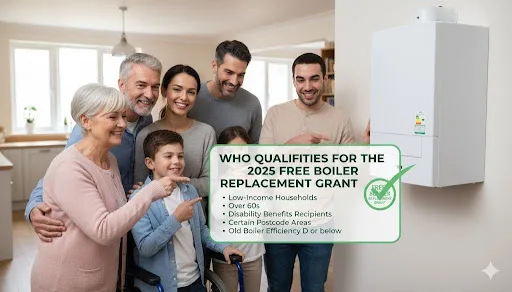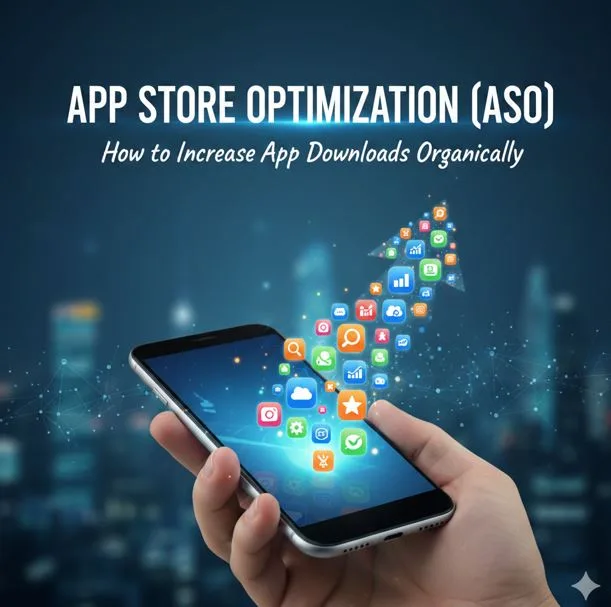Who Qualifies for the 2025 Free Boiler Replacement Grant
Your boiler costs you £2,000-£5,000 to replace. Or it costs nothing. The difference? Knowing if you qualify for the ECO4 grant.
Most households throwing money at energy bills don’t realise they’re eligible for Free Boiler Grants and free replacements. The government allocated £4 billion through March 2026, yet thousands of qualifying homeowners haven’t claimed. Why? They assume grants are “for other people.”
Let me be direct: if you meet the criteria, you’re leaving money on the table. Here’s who actually qualifies.
Understanding ECO4: The £4 Billion Programme Nobody Talks About
The Energy Company Obligation scheme forces large energy suppliers to fund efficiency upgrades. Not loans. Not rebates. Free installations for eligible households.
The target? Low-income and vulnerable homes with poor energy performance. The goal? Lift properties to EPC band C minimum while slashing fuel poverty nationwide.
This runs until March 2026, but could close earlier if suppliers hit carbon targets ahead of schedule. Translation? Apply now or risk missing out entirely.
Who Qualifies: The Three Pathways
Eligibility isn’t mysterious. It follows clear criteria across benefit receipt, income thresholds, and property conditions. Let’s break down each pathway.
Benefit-Based Eligibility: The Fast Track
Receiving any of these benefits? You’re automatically considered:
| Qualifying Benefits |
| Universal Credit |
| Pension Credit (Guarantee or Savings) |
| Income Support |
| Income-based JSA |
| Income-related ESA |
| Child Tax Credit |
| Working Tax Credit |
| Housing Benefit |
| Child Benefit (with income under £31,000) |
One qualifying benefit establishes financial need under the standard ECO4 route. Simple eligibility check: if you receive it, you qualify for assessment.
ECO4 Flex: The Income Route
Not on benefits but still struggling? The Flex pathway uses income-based qualification instead.
Household earning under £31,000 annually? Your local authority can nominate you through their Declaration of Eligibility. This recognises what government bureaucrats often miss; plenty of struggling households fall outside traditional benefit systems.
Local councils issue Statements of Intent outlining their participation. Contact yours to check Flex eligibility. They’ll assess income alongside vulnerability factors like health conditions or family composition.
Property Requirements: The Technical Gatekeepers
Your home must meet specific conditions regardless of which pathway you use.
EPC Rating: D or lower (D, E, F, or G). Check your rating on the government’s EPC register. Properties rated C or above are considered efficient; you won’t qualify.
Property Type: Homeowners and private tenants both eligible. Tenants need written landlord permission before proceeding. Social housing residents qualify but should contact housing providers first.
Mains Gas Connection: Most schemes require gas grid connection. Off-grid properties should explore the Boiler Upgrade Scheme instead for alternative heating solutions.
Boiler Age Matters More Than You Think
Your existing boiler needs to be genuinely inefficient; new efficient models won’t qualify because repair is cost-effective.
- Minimum age: 8 years old (some schemes accept 7+ years)
- Type: Non-condensing or inefficient models
- Condition: Broken, inefficient, or approaching failure
Why the age threshold? Boilers installed 15+ years ago operate at 60-70% efficiency, wasting up to 40% of fuel costs. They’re haemorrhaging money every day they run.
Modern condensing boilers? 90%+ efficiency. The difference translates to £300-£500 annual savings for typical households, with larger properties saving £500-£800+ yearly.
Vulnerable Groups Get Priority
The scheme explicitly prioritises households facing additional heating challenges. Let’s examine who gets fast-tracked.
Are You Over 60?
Pensioners receive priority consideration, especially those on Pension Credit. Why? You spend more time at home, and cold housing poses serious health risks.
The scheme recognises this vulnerability and ensures seniors have access to warm, efficient heating without financial burden. Age alone doesn’t guarantee eligibility, but it strengthens applications when combined with benefit receipt or low income.
Disabled Households Face Higher Costs
Research shows disabled households need an additional £1,010 monthly to maintain equivalent living standards. Over 55% of disabled working-age adults struggle with energy bills.
While PIP and DLA no longer directly qualify for grants, disabled individuals receiving Universal Credit, ESA, or other qualifying benefits remain eligible. Health conditions aggravated by cold; respiratory disease, cardiovascular issues, mobility disorders; receive special consideration.
Families with Young Children
Receiving Child Benefit with a household income under £31,000? You qualify. The scheme recognises that families struggling to heat their homes adequately put children at risk.
Young children are particularly vulnerable to cold-related health impacts. This pathway ensures families maintain safe home temperatures without choosing between heating and other essentials.
Landlords and Tenants: Who Benefits?
Both parties gain from ECO4, though the application process differs significantly.
Private Tenants: You can apply directly, but you need landlord consent in writing. No permission? Application stops immediately. The landlord owns the heating system, so their approval is legally required.
Landlords: You benefit through property improvements at zero cost. Upgraded boilers increase property value, improve EPC ratings, reduce void periods, and help meet Minimum Energy Efficiency Standards (MEES). You can’t apply directly on tenant’s behalf, but you can facilitate the process by providing approvals and property details.
Social Housing: Residents with EPC ratings D or lower qualify. Contact your housing provider first; they handle applications differently from private sector schemes.
What the Grant Actually Covers
This isn’t a voucher or discount. It’s a comprehensive replacement at no cost:
- Complete old boiler removal
- New A-rated condensing boiler (£2,000-£5,000 value)
- All pipework, radiators, and heating controls
- System flushing and connection upgrades
- Gas Safe registered installation
- Manufacturer warranty and documentation
- Full commissioning and safety testing
Some eligible households receive additional measures like insulation or smart thermostats through whole-house retrofit approaches. The grant covers everything needed for a fully functioning, efficient heating system.
Application Process: Four Weeks to Installation
Stop overthinking this. The process is straightforward:
- Check eligibility using approved installer checkers
- Gather documents: benefit proof, photo ID, address proof, property ownership/tenancy agreement, EPC certificate
- Contact approved installer: Only ECO4-registered installers can process applications; verify credentials first
- Home survey: A Qualified surveyor assesses the property and the current heating system
- Application review: Funding approval typically takes 1-2 weeks
- Installation: Gas Safe engineers complete work within 2-6 weeks of approval
Total timeline? 3-4 weeks from application to new boiler. Compare that to years of overpaying for inefficient heating.
Scam Protection: What Legitimate Schemes Never Do
ECO4 is genuine government funding. Scammers exploit its popularity to defraud vulnerable households. Protect yourself:
Red flags that scream “fraud”:
- Requesting upfront payment (legitimate schemes never charge)
- Pressure tactics demanding immediate decisions
- Unverified company credentials
- Suspicious cold calls or messages
- Refusal to provide company registration details
Always verify: Check installer credentials through MCS certification and ECO4 registration. Confirm company legitimacy through Companies House. Report suspicious contact to Action Fraud or Citizens Advice.
Apply only through government-approved installers. No exceptions.
The Bottom Line
The scheme runs until March 31, 2026, but waiting until the deadline is tactical stupidity.
Why? Energy suppliers can meet carbon targets early and close applications ahead of schedule. Funding is finite. Demand is high. The last-minute rush will create application backlogs and rejection rates. Additionally, up to 50% of ECO4 obligations flow through Flex routes, with local authorities playing expanded roles.
More eligible households than ever compete for the same funding pool — especially those applying under the boiler replacement scheme over 60s, which continues to attract strong interest from senior homeowners seeking energy-efficient heating upgrades.
FAQ
Can I qualify without benefits?
Yes, through ECO4 Flex. Local authorities refer to households earning under £31,000 annually, even without qualifying for benefits. Contact your council to check their participation and criteria.
Do tenants really qualify?
Private tenants absolutely qualify, but landlord permission is mandatory. No written consent? Application dies immediately. Social housing tenants should contact housing providers directly.
What’s the minimum boiler age?
8 years old for most schemes, though some accept 7+ years. The boiler should be inefficient or non-condensing. Newer, efficient models don’t qualify; repair is more cost-effective than replacement.
What EPC rating do I need?
D or lower (D, E, F, or G). Properties rated C or above are considered efficient and won’t qualify except under special circumstances. Check your rating on the government’s official EPC register; certificates are valid for 10 years.
Are there hidden costs?
For eligible households, installation is genuinely free. This includes old boiler removal, new A-rated system, all components, and Gas Safe installation. Rare complex installations may require small contributions, but these are disclosed upfront before work begins. No surprises.






